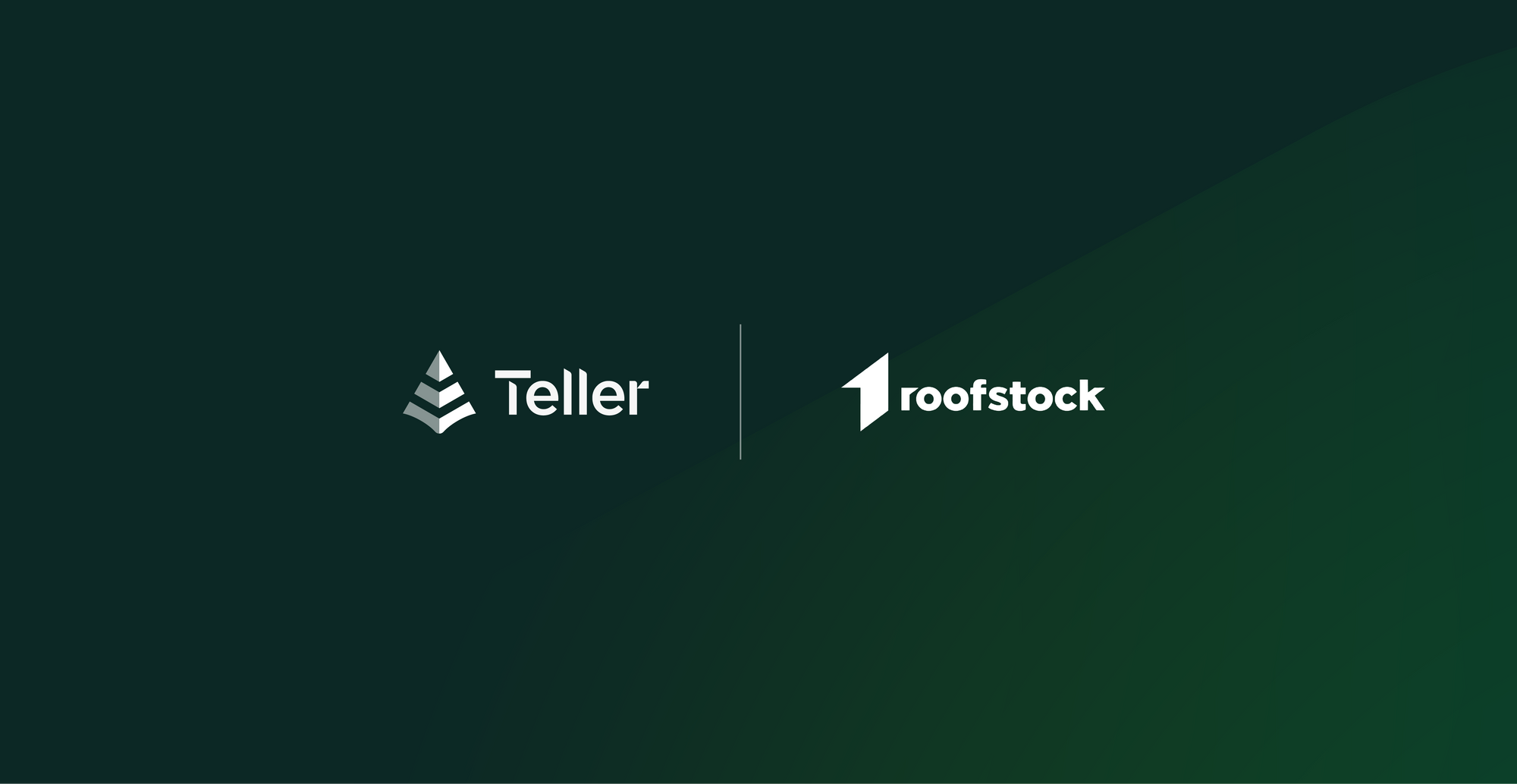Roofstock Leverages the Teller Protocol to Enable Financing of Tokenized Real Estate Properties with the USDC Homes Lending Pool

Roofstock, one of the world’s leading online marketplace for real estate investors in the single-family rental (SFR) home sector, will be leveraging the Teller protocol to enable the financing of real estate properties using USDC Homes.
Roofstock has launched the first on-chain NFT legally connected to a real-world LLC. Buyers on the Roofstock onChain, a Web3 subsidiary of Roofstock, can now finance the purchases of tokenized real estate properties listed on their marketplace by getting loans on USDC Homes, a DeFi lending pool built on Teller protocol. NFT buyers can seek a loan for up to 80% LTV on the sale price of the NFT on USDC Homes. A single lender on-chain will fund the loan.
Explaining On-chain Home Financing with Roofstock onChain and USDC Homes
Before we dive deeper into the features of this collaboration and how the lending of the NFTs work, it is important to learn about the two products and how they work individually.
Roofstock onChain Explained
Roofstock onChain tokenizes single-family houses on blockchain and lists them on their marketplace. They associate title with each home to a single member limited liability company (LLC) and mints a new Home onChain Token. Home onChain tokens are Non-Fungible Tokens (NFTs) on the Ethereum blockchain. This way, the platform utilizes the blockchain to represent the ownership interest of each LLC in the form of an NFT. The ownership of the LLC (NFT) represents the ownership of the related property and can be transferred on-chain legally.
It is imperative for every NFT (LLC) buyer to select a property management company that insures that the investors or buyers of the properties are using the property only as an investment and not as a personal residence.
USDC Homes Explained
USDC Homes is a DeFi lending pool for crypto-native home buyers to attain crypto-native financing. The platform partners with a network of underwriters and data providers to verify identity and provide creditworthiness reviews for lenders.
Liquidity providers can lend to individual property-backed loans through the USDC Homes pool on Teller. USDC.homes offers both unsecured and secured lending options, where ETH, BTC, USDC, and other popular coins can be provided as collateral. Though all transactions related to the loan take place on-chain, borrowers can include off-chain data such as their credit score when applying.
How does borrowing and lending of the NFT work?
Like in every Teller pool, users can participate as lenders or borrowers. There are 3 main participants in the USDC Homes marketplace that interact to make the financing of the LLCs possible:
- Borrowers - Borrowers are the buyers of the properties. They are taking loans to fund their purchase.
- Lenders - Lenders are the users that are providing loans to the borrowers.
- Underwriters - Financial experts that will review and assess the applications submitted by the borrowers.
A step-by-step walkthrough for both participants is explained below.
For Borrowers/Buyers
- Before submitting any loan request on the USDC Homes lending pool, borrowers must have a KYC token from Roofstock. The KYC token can be minted here.
- Once the buyer receives the token, they must fill out the USDC Homes application form to apply for the loan.
- USDC Home’s team will reach out to the user to request additional information from the underwriter. This information can be any relevant information such as credit reports, bank statements, and pay stubs.
- After an underwriter evaluates the buyer’s application, they will share the report with the team at USDC Homes. The borrowers are then added to the USDC Homes pool on the condition that they agree to the pre-set terms set by the lenders.
- The borrower can now request financing based on either (a) their asks for APR, duration, etc or (b) the terms that the lender recommends to finance the NFT.
For Lenders
- Lenders can view all the loan requests created by the borrowers to finance buying their NFTs.
- The lender can decide which buyer’s loan request to fund, based on the following criteria:
- Assessment report shared by the underwriter
- Whether the borrower agrees to the lender’s terms or not
- Terms set by the borrower
Once the lender approves and funds the borrower’s request, the USDC Homes platform will use the funds to purchase the LLC NFT and, after that, deposit the NFT in an escrow account until the borrower pays back the entire loan with interest.
- If the borrower pays the loan back, the borrower will receive the NFT in their own wallets, claiming complete ownership of the NFT.
- If the borrower defaults, the lender will have the option to claim the ownership of the LLC NFT.
The First Property is Listed! Start Buying Today!
All the active listings on Roofstock onChain are available on their marketplace. The first property in the United States you can purchase with a loan from USDC Homes has already been published here.
The property is situated at 149 Cottage Lake Way, Columbia, South Carolina, 29209. All the details about the property, like the number of bedrooms, the number of bathrooms, the year built, and the plot size, can be found on its marketplace page. To corroborate the details of the property, lenders and borrowers can visit the property’s Zillow page, where they can also find additional information along with the images of the property.
FAQ
General Roofstock onChain FAQs can be found here. Following are the FAQs that are subject to financing the purchases of the properties on Roofstock onChain using USDC Homes.
How can the lender be assured that the LLC owner cannot change title ownership?
LLC owner is the wallet that has access to the NFT through a private key of the member wallet address. In this use case, the member wallet address is a MultiSig wallet. The lender is a co-owner of this multi-sig wallet, which gives them full transparency over the LLC assets. For any change to implement on the assets or NFTs stored in the MultiSigWallet, the lender’s approval will be required
How can the lender be assured that the LLC will ultimately own title to the property?
The Rightful owner of the LLC (NFT) possesses the private key of a MultiSigWallet (as per LLC Agreement), to which the lender also has access to. Any changes in the ownership of LLC and, henceforth, the property cannot be completed without the lender’s approval. The LLC in Wyoming is incorporated in such a manner that the changes to the ownership between LLC & the property are prohibited.
How can the lender attain a current value estimate of the property
Lenders can check Zillow, one of America’s top tech real-estate marketplace, to learn about the estimate values of the properties listed on Roofstock onChain marketplace. For example, the estimate value property in Columbia, South Carolina we discussed above can be found here.
What happens if the borrower defaults and the lender has not received the repayment in its entirety?
The borrowers are considered to have defaulted on the loan if they miss the loan payments for 3 consecutive months. In this case, the NFT will be transferred from the multi-sig to the lender’s private wallet. The multi-sig wallet would require 2 out of 3 owners (borrower, pool owner & lender) to sign the transaction. After the transaction, the lender will have the complete ownership of the NFT and thus, the home property. The lender can decide whether to continue to own the property or sell it to another buyer.
How is the interest rate of the loan determined?
Loan terms are determined mutually between the borrower who submits a loan request and the lender who is willing to accept the terms. There will be multiple borrowers & lenders in the marketplace looking for terms that would be acceptable for both parties. Like the bid and ask orders in the order books meet, the transaction takes place whenever the lender and borrower agree with each other on the terms.
About Roofstock
Founded in 2015 by Gary Beasley, Gregor Watson, and Rich Ford, Roofstock is an online real estate marketplace that brings together buyers and sellers of single-family rental properties. Roofstock has been an attractive destination for investors interested in collecting regular rental income as the single-family rental properties they buy are mostly tenant-occupied.
Roofstock offers investment properties in roughly 27 states and has already surpassed $4 billion in transactions. In addition to the Roofstock Marketplace, the company provides REIT investments to accredited investors through its Roofstock One platform.
About Teller
Teller is an algorithmic credit risk protocol built to enable the creation of decentralized lending markets that can offer unsecured loans. The protocol’s unique cloud-based infrastructure can connect to and privately compute credit and banking data to generate individual loan terms based on a user’s creditworthiness. Teller Protocol was designed to develop decentralized loan products without collateralized debt, reducing consumer risk and costs. Teller can interoperate with centralized finance data, offering everyone the freedom to develop a new wealth of trustless financial instruments.
Marketplaces and lending platforms can integrate the Teller Protocol to fill loan requests, allowing lenders to decide what loans to fill based on the appended borrower data. The Teller Protocol widens the scope of potential market participants in digital asset lending, fostering acceleration of DeFi adoption, and ultimately facilitating the development of a new class of cryptocurrency loan products tied to both off-chain and on-chain credit signals.
